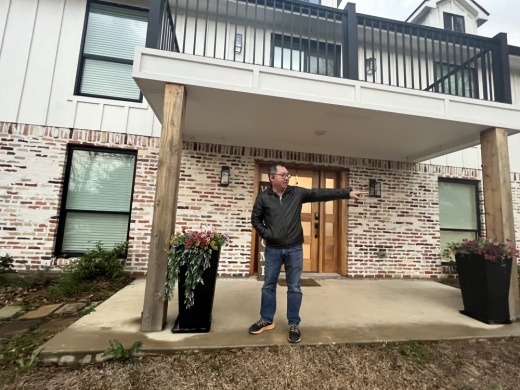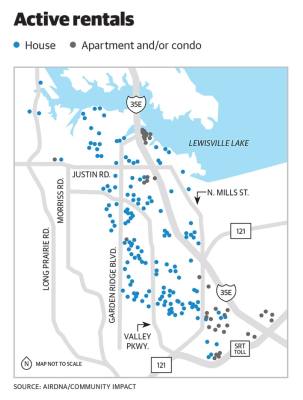Chris McGinn, Lewisville director of neighborhood and inspection services, said the city uses a third-party vendor to track short-term rentals on 75 different posting sites. At the end of January, city officials said short-term rental listings within city limits had grown by 145% since they started tracking in January 2020 to January 2024. McGinn said the city had verified all 112 of the 137 known short-term rentals posted online by Feb. 20.
“We know there are more out there, but we haven’t been able to tie the photos to the actual address,” McGinn said. “The price that people pay for [a] short-term rental is fairly steep, so it has to be a good-looking location.”
The current situation
Lewisville City Council approved a one-year interim ban on new short-term rentals within the city at the Feb. 19 meeting. Mayor TJ Gilmore cast the deciding vote, with council members William Meridith, Patrick Kelly and Brandon Jones voting against the item.
The one-year interim ban went into effect March 4. Existing rental operators will have to pay a $400 annual permit to continue operating by July 8 and upload certain information to city officials before a permit is issued.
According to city data, 56% of short-term rental owners in Lewisville are city residents. Another 40% reside in Texas, while the other 4% are from out of state.
Council Member Ronni Cade, who voted against the one-year ban, said she previously rented out a cabin on her property. She said she understands the nuisances that are involved in short-term rentals from both sides of the issue.
The regulations include:
- Requiring an annual permit prior to operating, renting or advertising a short-term rental
- Owners can’t be delinquent on any city taxes, including hotel occupancy taxes
- The unit has to pass an inspection and has to be registered for hotel occupancy taxes
- The property owner will have to provide the proper number of bedrooms that meet the International Property Maintenance Code standards
- They require the designation of a property manager who can respond to issues
- Violation of the ordinance can result in a fine not to exceed $500 for each offense, unless the violation relates to safety, zoning or public health.
“Short-term rentals are very disruptive and they don’t belong in residential areas,” said David Margulies, member of the Lewisville Neighborhood Coalition.
“It is just not a Lewisville issue,” said Brent Myers, broker and owner of ERA Myers & Myers Realty. “It is an ongoing situation, and we would love to work and find a solution that works with everybody.”
A closer look
The regulations define short-term rental units as any dwelling offered for rent for less than 30 consecutive days.
Quoc Lam owns a short-term rental on East Shore Drive in Lewisville. He said he bought the house in 2020 as an investment, but it has turned into a family affair as his children, ages 11 and 8, have helped in the two-year remodel and renovation. His children have even helped build some of the furniture inside the house, including the nightstands in one of the three bedrooms.
“This is a prime location, and I don’t want to give it to just one person,” said Lam, a former Lewisville resident. “With short-term [rental], I want a lot more people to benefit for many years. I can give it to 100 people over a year and so a lot of people can see how unique the location is.”
McGinn said the number of short-term rentals fluctuates for various reasons—such as vacationers going to Lewisville Lake—but was 90 or higher throughout most of 2023.
What’s next
McGinn said the number of short-term rentals will likely remain steady or increase. The city has sporadically tracked them since 2020.
“Reporting hotel taxes...might affect [operators’] cost so they might be persuaded to not be interested in doing that any longer,” he said.






